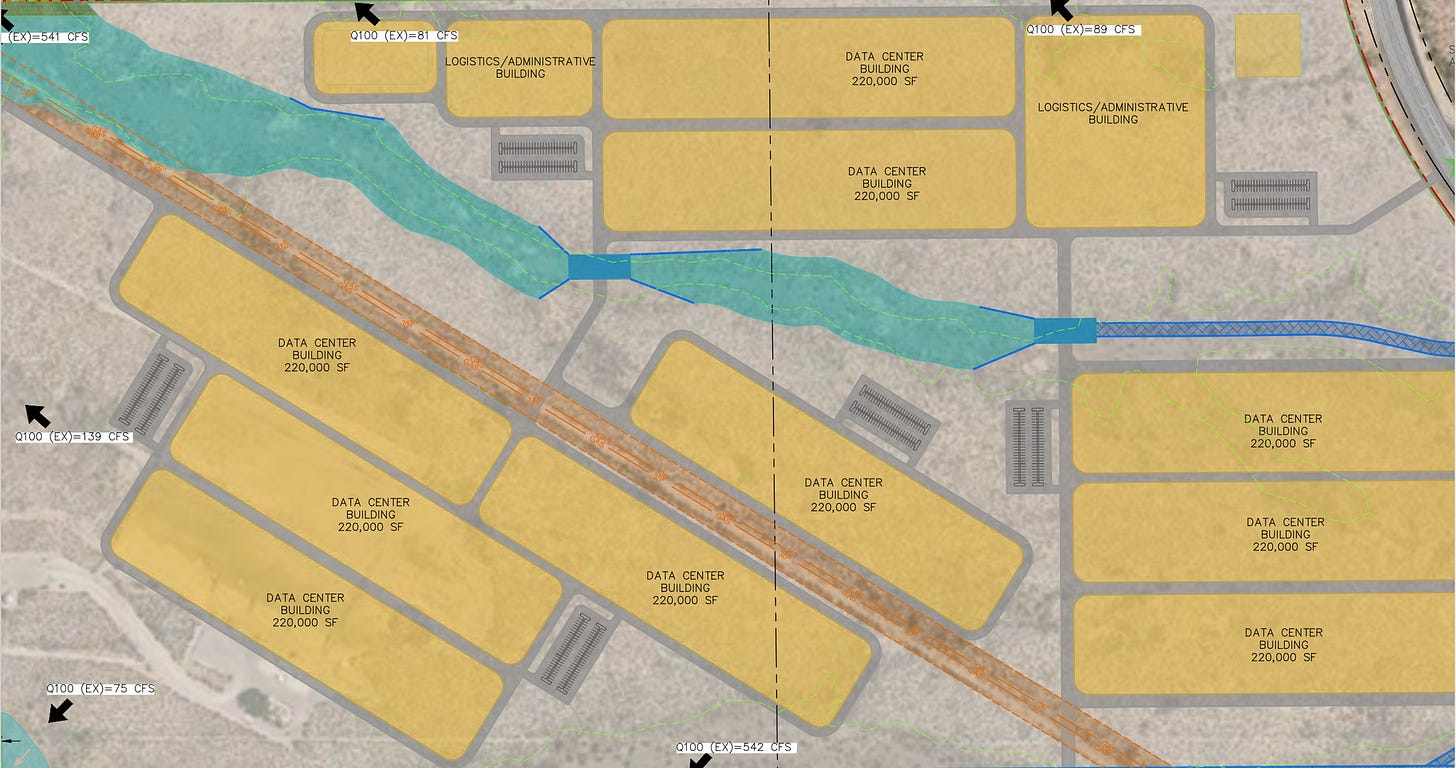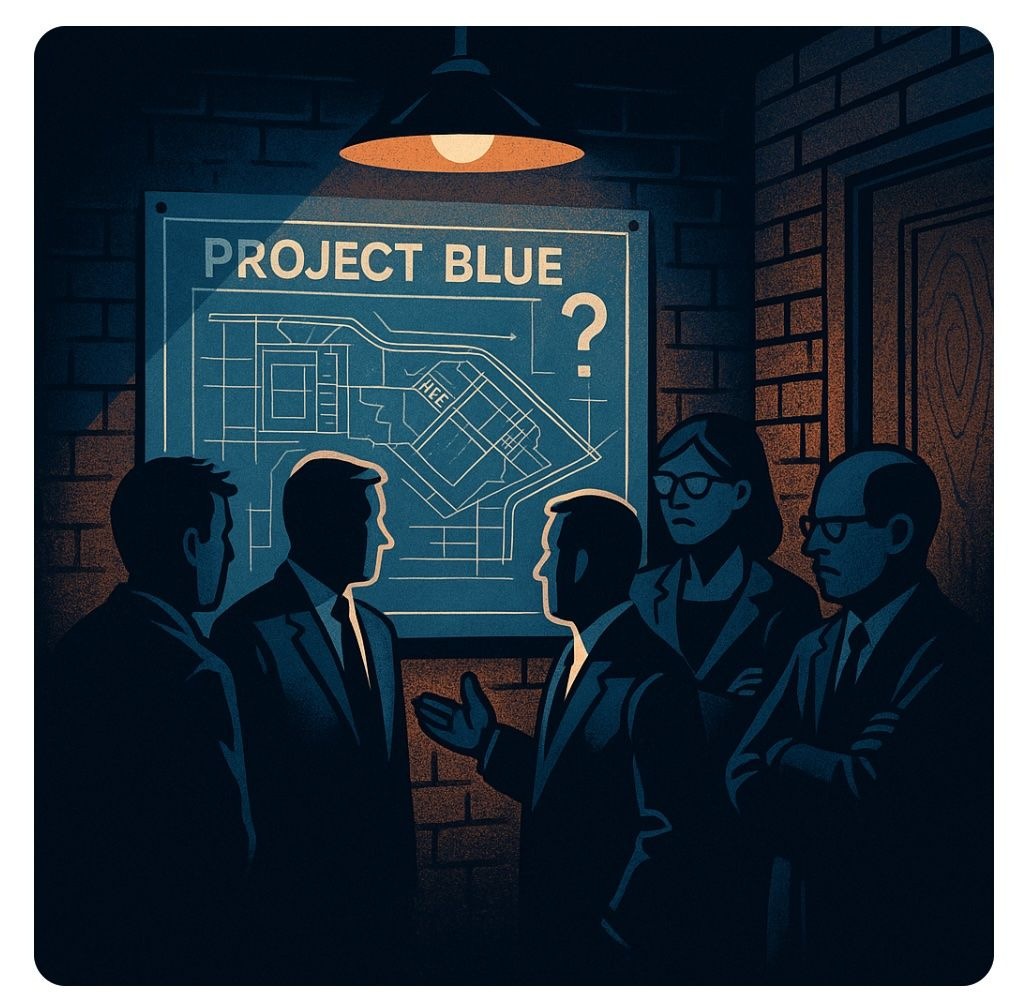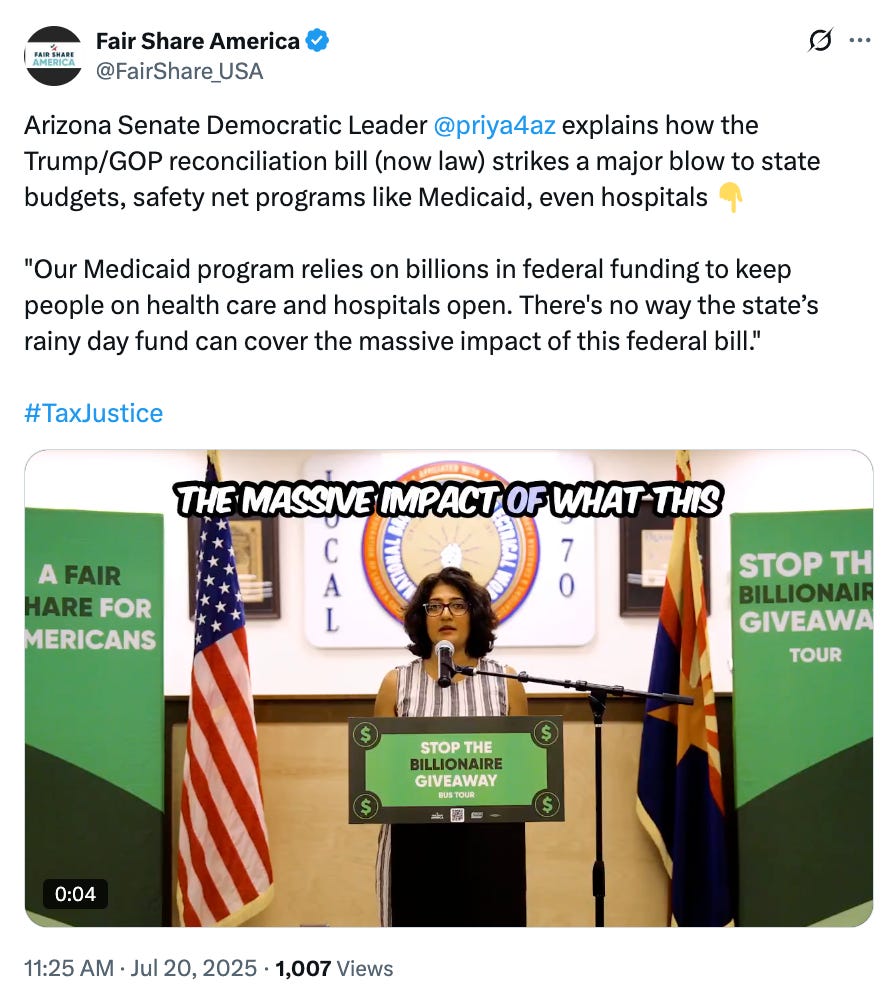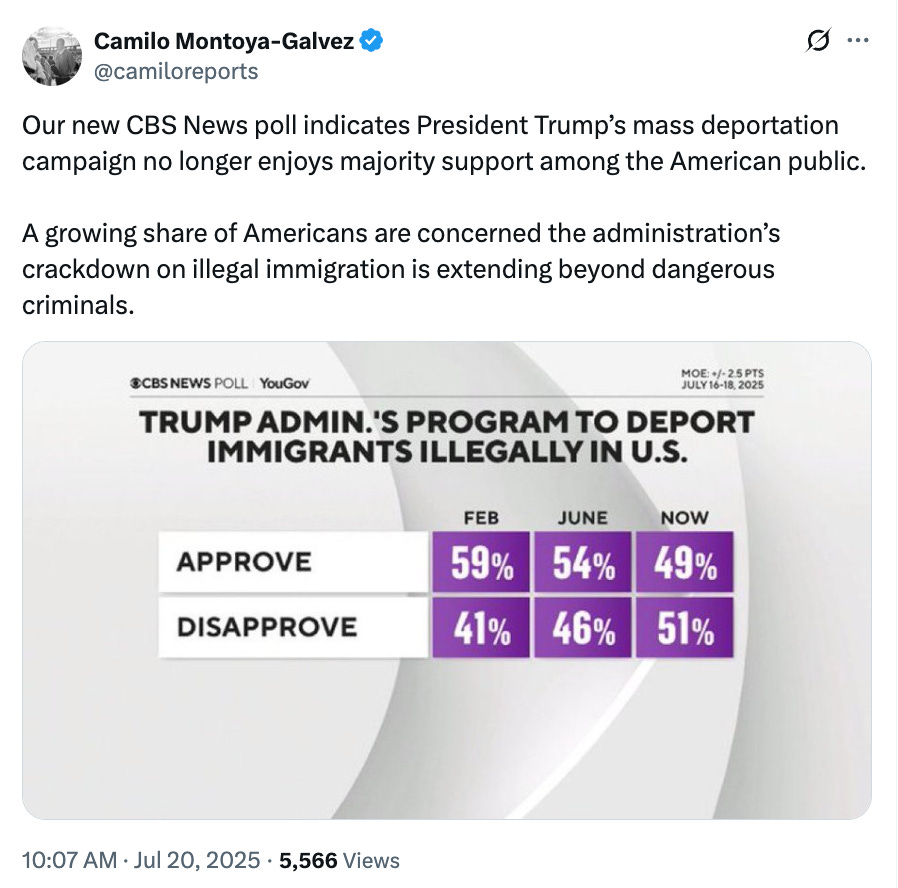Less red tape for Project Blue?
We’re getting Project 2025 vibes … The future of the river … And that's one big job "cut."
A major announcement from the Trump administration last week could make it easier for data centers to set up shop here in the Old Pueblo.
EPA Administrator Lee Zeldin laid out the plan in a Fox News editorial, describing it as part of the “Powering the Great American Comeback” initiative. His pitch: Slash red tape and overhaul permitting rules so that the “protest of a few does not unnecessarily thwart progress for all Americans.”
Zeldin warned that a coming wave of data centers to power the AI industry “will eat up nearly 10% of U.S. electricity supply in 10 years” — and argued that meeting that demand will require a major rewrite of EPA regulations.
“Much of the current Clean Air Act (CAA) requirements for building data centers dates back to the 1990s, when technology was practically prehistoric compared to modern advancements,” he wrote. “These rules require companies to install pollution control equipment when they build new facilities or make a change that increases emissions significantly.”
So far, Zeldin hasn’t taken any formal action. But his proposal closely mirrors the goals outlined in Project 2025, which calls for narrowing the EPA’s role to enforcing clear-cut legal violations — and pulling back from broader efforts to cut emissions or tackle climate change.
One key Project 2025 goal: make it easier for utilities to build or expand power plants. That includes changing how the EPA calculates a facility’s “potential to emit” — basing it on actual run-times instead of assuming 24/7 operation, which often triggers stricter regulation.
So where does Project Blue fit in?
We’ve previously reported that Pima County is edging dangerously close to violating federal ozone standards — especially near the proposed first phase of Project Blue. A new substation or backup diesel generators could make things worse for air quality in the area.
One of the biggest unanswered questions remains: How will Tucson Electric Power (TEP) provide enough electricity for the sprawling campuses tied to the project?1
Thanks to NDAs, TEP hasn’t had to share how it or the developer plans to generate the 1.3 gigawatts of electricity needed for the two Project Blue campuses.
We know a little more about the first phase — 10 data centers near the Pima County Fairgrounds — than we do about the so-called “secondary project,” which public records suggest would require even more water and electricity than Phase One.
Under current Clean Air Act rules, building a new generation facility — whether natural gas or solar — could take TEP several years to fully permit.
But Zeldin is pushing to shorten that timeline. In his editorial, he floated the idea that companies should be able to start building power plants before air quality permits are issued:
“At (the) EPA, we are also working on redefining preconstruction, which would, if finalized, only require a company to obtain an air permit when the company actually breaks ground,” Zeldin wrote. “A company looking to build an industrial facility or a power plant should be able to build what it can before obtaining an emissions permit.”
According to the Project 2025 tracker, the Trump administration has already taken action on 7 out of 14 EPA-related proposals and is actively working on two more.
TEP has told us they’ve identified how to provide electricity for the first phase of Project Blue — which could require up to 350 megawatts — and say they’re working closely with the developer on a long-term solution for the full 1.3 gigawatts.
But those assurances are vague.
And if Zeldin’s plans move forward, utilities like TEP may get a much faster, less regulated path to generating power for energy-hungry data centers.
Reading between the lines of Zeldin’s editorial, here’s what that could mean for TEP:
Build a new power plant, likely with fewer restrictions and less public oversight than today
Keep its coal-fired generators running past the current 2032 retirement deadline
In a longshot move, try to restart two decommissioned turbines
TEP has made public assurances it is committed to renewable energy and using massive battery banks for Project Blue, but it is hard to predict how Zeldin’s proposals would impact their long-term goals.
We are optimistic that we will hear more details on Wednesday, when the city holds its first public meeting about Project Blue.
Covering Project Blue is becoming a full-time job, even as the regulatory rules change right underneath our feet. Help us stay on the story by becoming a paid subscriber today.
Water worries: A stretch of the Santa Cruz River in Marana could start competing with the Project Blue data centers for effluent, the Arizona Daily Star’s Tony Davis reports. Michael Bogan, an associate professor of natural resources at the University of Arizona, worries the water that right now nurtures habitat for plants, animals and birds on the river could get diverted to the data centers to cool equipment. Tucson officials vehemently disagree with Bogan, saying Project Blue won’t need the effluent that sustains the river. It’s just one of many unanswered questions about Project Blue, and the Star’s editorial board appears to be fed up with the people behind the project not being transparent with the public, especially when so much water, electricity and public land are at stake.
“It was recently said that if Project Blue’s prospective operator is outed, ‘they will walk.’ Maybe that’s not the worst thing that could happen,” the Star’s editorial read.
Revenge campaign: In the lead-up to the Congressional District 7 primary election, a cybersecurity attack hit the candidate portal, and officials at the Arizona Secretary of State’s Office are “moderately confident” the attack came from Iran, KJZZ’s Camryn Sanchez reports. The attack led to images of candidates being replaced with a photo of Iranian Ayatollah Ruhollah Musavi Khomeini, and adding links to social media accounts about “erosion revenge” for the Trump administration’s bombing of Iran.
Sign of inexperience: CD7 candidate Deja Foxx dropped the ball when it came time to concede the Democratic primary to Adelita Grijalva, Tucson Sentinel columnist Blake Morlock writes. Instead of making a clear concession speech in front of her supporters, she first spoke via Zoom and even then she didn’t hit the basic notes expected of candidates who lose a primary.
“The results came in and you delivered two kinda-sorta concession speeches except for in neither did you concede the race and endorse the winner,” Morlock wrote the day after the election. “Finally, this morning you endorsed. For someone who claims to know how fast information moves today on platforms around the world, it took a full 12 hours to actually do what you needed to do, which means you didn't really do it.”
Only fools rush in: As the Trump administration starts hiring thousands more ICE agents, Border Patrol agents and customs officers, they should remember the disastrous hiring sprees that followed big-time cash influxes for border enforcement under previous administrations, Star columnist Tim Steller writes. Those sprees led to arrests for misconduct and corruption, including a Border Patrol agent in Tucson who also was a murderous drug dealer. In other immigration news, the owners of Colt Grill, a barbecue chain in northern Arizona, were indicted for hiring people who didn’t have authorization to work in the U.S. and not paying them what they were owed, KJZZ’s Nick Karmia reported. Those arrests were made under the federal “Operation Take Back America” that the Trump administration launched in March. The Colt Grill arrests came just a week or so after the owner of a taco truck in Phoenix was arrested on similar charges.
Back on the menu: After withholding billions of dollars in education funding over what the Trump administration called a “radical left-wing agenda” at some schools, federal officials released part of those funds. That means the Tucson Unified School District can provide before and after-school programs for students this fall, the Arizona Luminaria’s Shannon Conner reports. TUSD is still waiting on another $4 million in frozen federal funding.
Props to Tucson Sentinel’s Dylan Smith and Paul Ingram for their interview with Tucson City Councilwoman Nikki Lee on the Bill Buckmaster Show Friday — where they filled in for Buckmaster.
The pair got Lee to admit what Project Blue skeptics have long suspected: The deal with Pima County doesn’t actually promise 180 jobs. Nope — the real number is a minimum of 75. That’s right, all the breathless boosterism was overselling it by more than half.

This helpful rendering of the 290-acre site from Pima County includes the parking lots for all of the employees for Project Blue at full build out. Maybe they’ll carpool?Lee, to her credit, knows the data center playbook — big promises on Day One, underwhelming delivery by Year Three.
“It's so important because we have seen in other communities, unfortunately, a lot of promises made and not always kept, especially as it relates to jobs,” Lee said. “The only response I've gotten on that is that it was in the county's agreement that there is a financial penalty if 75 jobs averaging $75,000 a year are not created.”
And about that “penalty”? It’s barely a wrist slap. Smith pointed out that after ten years, the fine could be just $500,000.
That’s couch cushion money for a company building a billion-dollar server farm.
“It may be cheaper to write a check than to hire the folks and pay for benefits. So that's a very real risk that we have to address,” Lee said.
Translation: If Project Blue wants to ghost us on job creation, the check’s already in the mail.
A handful of data centers have sidestepped the grid entirely, relying on diesel generators — which emit far more pollution than modern compressed natural gas turbines. And yes, there are even whispers about co-locating substations with small modular nuclear reactors.









Project Blue is an enormous boondoggle! Its hard to imagine a worse proposal following so closely on Prop 414, which i would have thought was the most unpopular idea from Mayor and Council. But noooooo, they can outdo even that if they vote yes to this. Lets hope they look at their political futures and decide that they don't want to be remembered for removing grass at public parks, incentivizing draining swimming pools and zero-scapes in order to give our water to the Saudis for alfalfa--oops! We don't even know who it will go to!!! Call your councilmember NOW! NO to Project Blue. A heat generating plant that takes monumental amts of water does NOT belong in the desert!
Hiring thousands of new ICE Agents without a polygraph test will be a disaster. (See Tim Steller's story in the Star.)
When I served as a police commissioner, I moved the lie-box test to the front of the hiring application process. This cut 80% of the candidates from consideration and significantly reduced the background workload (vetting) for our detective bureau before written tests and personal interviews.
In my experience, the polygraph exam is mandatory in law enforcement. Sen. Gallego has never conducted this type of hiring and does not fully comprehend the essential need for this in policing.